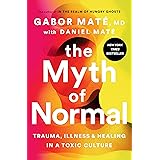
Enjoy fast, free delivery, exclusive deals, and award-winning movies & TV shows with Prime
Try Prime
and start saving today with fast, free delivery
Amazon Prime includes:
Fast, FREE Delivery is available to Prime members. To join, select "Try Amazon Prime and start saving today with Fast, FREE Delivery" below the Add to Cart button.
Amazon Prime members enjoy:- Cardmembers earn 5% Back at Amazon.com with a Prime Credit Card.
- Unlimited Free Two-Day Delivery
- Streaming of thousands of movies and TV shows with limited ads on Prime Video.
- A Kindle book to borrow for free each month - with no due dates
- Listen to over 2 million songs and hundreds of playlists
- Unlimited photo storage with anywhere access
Important: Your credit card will NOT be charged when you start your free trial or if you cancel during the trial period. If you're happy with Amazon Prime, do nothing. At the end of the free trial, your membership will automatically upgrade to a monthly membership.
Buy new:
$15.99$15.99
Buy used: $9.33





Download the free Kindle app and start reading Kindle books instantly on your smartphone, tablet, or computer - no Kindle device required.
Read instantly on your browser with Kindle for Web.
Using your mobile phone camera - scan the code below and download the Kindle app.

Image Unavailable
Color:
-

-
-
- To view this video download Flash Player
-

-

-
 VIDEO
VIDEO -

 Audible sample Sample
Audible sample Sample 


Follow the author
OK
The Great Pretender: The Undercover Mission That Changed Our Understanding of Madness Hardcover – November 5, 2019

Explore your book, then jump right back to where you left off with Page Flip.
View high quality images that let you zoom in to take a closer look.
Enjoy features only possible in digital – start reading right away, carry your library with you, adjust the font, create shareable notes and highlights, and more.
Discover additional details about the events, people, and places in your book, with Wikipedia integration.
Purchase options and add-ons
Named a Best Book of 2020 by The Guardian * The Telegraph * The Times
"One of America's most courageous young journalists" and the author of the #1 New York Times bestselling memoir Brain on Fire investigates the shocking mystery behind the dramatic experiment that revolutionized modern medicine in this international bestseller (NPR).
Doctors have struggled for centuries to define insanity--how do you diagnose it, how do you treat it, how do you even know what it is? In search of an answer, in the 1970s a Stanford psychologist named David Rosenhan and seven other people--sane, healthy, well-adjusted members of society--went undercover into asylums around America to test the legitimacy of psychiatry's labels. Forced to remain inside until they'd "proven" themselves sane, all eight emerged with alarming diagnoses and even more troubling stories of their treatment. Rosenhan's watershed study broke open the field of psychiatry, closing down institutions and changing mental health diagnosis forever.
But, as Cahalan's explosive new research shows in this real-life detective story, very little in this saga is exactly as it seems. What really happened behind those closed asylum doors?
- Print length400 pages
- LanguageEnglish
- PublisherGrand Central Publishing
- Publication dateNovember 5, 2019
- Dimensions6.4 x 1.55 x 9.3 inches
- ISBN-101538715287
- ISBN-13978-1538715284
Frequently bought together

Similar items that may ship from close to you
 The Minds of Billy MilliganMass Market Paperback
The Minds of Billy MilliganMass Market Paperback
From the Publisher




|
|
|
|
|---|---|---|
|
|
|
|
Editorial Reviews
Amazon.com Review
Diseases like that are called the great pretenders, because their symptoms mimic the behaviors of psychiatric illnesses. Cahalan’s personal experience led her deeper into the study of mental health, where she learned of a groundbreaking 1973 study called “On Being Sane in Insane Places.” In that study, a Stanford psychologist named David Rosenhan, along with seven other sane people, volunteered to get themselves committed into asylums by repeating the words “thud, empty, hollow.” That was pretty much all it took. Eventually, they had to find their way out.
The Great Pretender is a panoramic look at the mental health industry, but at its center is a mystery. As Cahalan, who is a journalist, sets out to learn more about Rosenhan’s study, her work uncovers as many questions as it does answers. The result is a book that broadens our understanding of a system that many feel is broken, at the same time that it deepens our relationship to the people who are affected by that system (those who are admitted and those who are administering). It may also serve as a reminder that it’s not always good for us to meet our heroes. The more we read about Rosenhan, the more we begin to wonder if he wasn't a different kind of pretender than people thought him to be.--Chris Schluep, Amazon Book Review
Review
Named a Best Book of the Month by the New York Times, Washington Post, O Magazine, San Francisco Chronicle, Houston Chronicle, Business Insider, Refinery29, Bustle, CrimeReads, Popsugar, and PureWow
Named a Best Book of the Fall by Kirkus, Bookish, and LitHub
"This is a well-crafted, gripping narrative that succeeds on many levels. Cahalan, who gained the trust of Rosenhan's family, is meticulous and sensitive in her research; compelling and insightful in her writing."―The Financial Times
"[A]n impressive feat of investigative journalism--tenaciously conduct, appealingly written... as compelling as a detective novel."―The Economist
"A sharp investigation into how human self-interest, weaknesses, and egos can shape the way that science proceeds."―Undark
"A fascinating, potent, and crucial read."―Buzzfeed
"A stranger-than-fiction thrill ride exposing the loose screws of our broken mental health system."―O Magazine, Best Books of December
"Cahalan's passionate and exhaustive reexamination of the famous research 'On Being Sane in Insane Places' by Stanford psychologist David Rosenhan is a riveting read...A terrific piece of detective work [with] fascinating insights into the mental health controversies that have swirled ever since the study's publication."―p.p1 {margin: 0.0px 0.0px 0.0px 0.0px; font: 11.0px Helvetica}span.s1 {font-kerning: none}Forbes
"The Great Pretender reads like a detective story, with Cahalan revealing tantalizing clues at opportune moments so we can experience the thrills of discovery alongside her...What she unearthed turned out to be far stranger, as documented in her absorbing new book, The Great Pretender. It's the kind of story that has levels to it, only instead of a townhouse it's more like an Escher print. On one level: A profile of Rosenhan and his study. On another: Cahalan's own experience of researching the book. And on a third: The fraught history of psychiatry and the pursuit of scientific knowledge."―New York Times
"Cahalan's research is dogged and her narrative riveting, leading us from red herring to clue and back with the dexterity of the best mystery novelists. Then she builds her case like a skilled prosecuting attorney."―p.p1 {margin: 0.0px 0.0px 0.0px 0.0px; font: 11.0px Helvetica}span.s1 {font-kerning: none}New York Journal of Books
"A thrilling mystery--and a powerful case for a deeper understanding of mental illness."―People Magazine
"A thrilling and lively work of investigative journalism...This vital book, full of intelligence and brio, is a must-read for anyone who has mental illness issues somewhere in their life -- i.e., everyone."―p.p1 {margin: 0.0px 0.0px 0.0px 0.0px; font: 11.0px Helvetica}span.s1 {font-kerning: none}Marion Winik, Minneapolis Star Tribune
"An urgent, personal book...The Great Pretender reads like a suspense novel, with the reader unable to stop turning the pages. [This book] cements Cahalan's place in the ranks of the country's sharpest writers of nonfiction. The Great Pretender is an essential book, an a plea for the world to come to terms with the way we're treating some of our most vulnerable people."―NPR
"A gripping, insightful read, The Great Pretender...has the urgency of a call to action."―TIME Magazine
"Bold, brave, and original, THE GREAT PRETENDER grips you as tightly as the madness it investigates. Cahalan writes with enormous intelligence and style, and propels you through this dark and fascinating journey into psychiatry and the very nature of sanity."―Susan Orlean, New York Times bestselling author of The Orchid Thief and The Library Book
"People have asked me over the years: If they liked The Psychopath Test, what should they read next? I now have an answer. THE GREAT PRETENDER is such an achievement. It is a wonderful look at the anti-psychiatry movement and a great adventure--gripping, investigative--and is destined to become a popular and important book."―Jon Ronson, New York Times bestselling author of The Psychopath Test and So You've Been Publicly Shamed
"A masterpiece of historical reconstruction...an intellectual detective story [and] a towering critique of our systems of mental health-care. If I could've written this book, I would have."―Ron Powers, New York Times bestselling author of No One Cares About Crazy People
"Engaging [and] illuminating."―Science
"The Great Pretender is a tight, propulsive, true-life detective story which somehow also doubles as a sweeping history of our broken mental health-care system. Cahalan herself has experienced this system as both a patient and a reporter, and her background informs every fascinating page of this dogged investigative odyssey. It is an amazing achievement, and there is no question it will go down as the definitive account of one of the most influential psychology experiments of all time."―p.p1 {margin: 0.0px 0.0px 0.0px 0.0px; font: 13.0px 'Times New Roman'}span.s1 {font-kerning: none}Luke Dittrich, New York Times bestselling author of Patient H.M.
"Breathtaking! Cahalan's brilliant, timely, and important book reshaped my understanding of mental health, psychiatric hospitals, and the history of scientific research. A must-read for anyone who's ever been to therapy, taken a brain-altering drug, or wondered why mental patients were released in droves in the 1980s. And a thrilling, eye-opening read even for those who thought they weren't affected by the psychiatric world."―p.p1 {margin: 0.0px 0.0px 0.0px 0.0px; font: 12.0px 'Times New Roman'}Ada Calhoun, author of St. Marks Is Dead and Wedding Toasts I'll Never Give
"Gripping [and] vivid...A well-told story fraught with both mystery and real-life aftershocks that set the psychiatric community on its ear...Cahalan follows all the leads like a bloodhound. Her pursuit reads like a well-tempered mystery being picked apart, with tantalizing questions for which many of the answers are just out of reach."―Kirkus, starred review
"Fascinating...Cahalan sets a new standard for investigative journalism...Her impeccable inquiry into the shadowy reality of Rosenhan's study makes an urgent case that the psychological and psychiatric fields must recover the public trust that 'Rosenhan helped shatter.'"―Publishers Weekly
"Brain on Fire was one of the most gripping, fascinating memoirs to come out in the last decade. Susannah Cahalan is back with what should be one of the most talked about books of 2019."―Inside Hook, 5 New Books You Should Be Reading This November
"Cahalan researched The Great Pretender over the course of five years, but the pages practically turn themselves. It's absorbing, sometimes sobering, sometimes seriously funny. Cahalan's narration makes the reading great fun, with an urgency occasionally akin to a thriller."―Shelf Awareness
"Brilliant...Indispensable reading."―Library Journal
"Engrossing."―Nature
"Susannah Cahalan has written a wonderful book that reflects years of persistent and remarkable historical detective work. The Great Pretender is an extraordinary look at the life of a Stanford professor and a famous paper he published in 1973, one that dramatically transformed American psychiatry in ways that still echo today. The book is fast-paced and artfully constructed--an incredible story that constitutes a tribute to Cahalan's powers as both a writer and a sleuth."―p.p1 {margin: 0.0px 0.0px 0.0px 0.0px; font: 12.0px 'Times New Roman'}Andrew Scull, author of Madness in Civilization: A Cultural History of Insanity
"A study that facilitated one of the most destructive changes in 20th-century domestic policy appears to be withering under scrutiny."―National Review
"A journalistic adventure story. . . Illuminates a game-changing moment in the history of psychiatry in this country."―NPR
"Cahalan is a gifted and dogged investigative reporter, and her work on this study is vital. The questions and concerns she raises about Rosenhan's research are long overdue."―Paste
About the Author
Product details
- Publisher : Grand Central Publishing; First Edition (November 5, 2019)
- Language : English
- Hardcover : 400 pages
- ISBN-10 : 1538715287
- ISBN-13 : 978-1538715284
- Item Weight : 1.32 pounds
- Dimensions : 6.4 x 1.55 x 9.3 inches
- Best Sellers Rank: #612,788 in Books (See Top 100 in Books)
- #135 in Medical Psychology History
- #158 in Schizophrenia (Books)
- #180 in Popular Psychology History
- Customer Reviews:
Videos
Videos for this product

1:30
Click to play video

The Great Pretender
Merchant Video
About the author

Discover more of the author’s books, see similar authors, read author blogs and more
Customer reviews
Customer Reviews, including Product Star Ratings help customers to learn more about the product and decide whether it is the right product for them.
To calculate the overall star rating and percentage breakdown by star, we don’t use a simple average. Instead, our system considers things like how recent a review is and if the reviewer bought the item on Amazon. It also analyzed reviews to verify trustworthiness.
Learn more how customers reviews work on AmazonReviews with images
-
Top reviews
Top reviews from the United States
There was a problem filtering reviews right now. Please try again later.
In the 1970’s a Stanford psychologist, David Rosenhan, set out to show that anyone could get themselves admitted to an asylum by changing just a few of their answers on an evaluation, and to show how they were treated once admitted even if they acted completely “normal”. The results of his study had a broad impact on the world of psychiatry. But as the author looked deeper into his study, she found that not all may have been as it was presented.
This book brings to light questions we should all be asking ourselves about psychiatry. About how patients are diagnosed and treated, and how we should all keep looking for solutions and answers rather than allowing the ones seeming to need treatment to disappear or remain on the outsides of society as other. I really would recommend this book to anyone. It was informative and interesting. It asks the tough questions. I give it 4.5 stars.
Cahalan had access to Rosenhan’s unpublished manuscript of a book, and his detailed notes of his own stay as a fake patient on a psychiatric ward in 1969. She tracked down two other fake patients. She uncovered numerous things that Rosenhan fabricated and lies he told. Much of Rosenhan’s famous paper could be neither supported nor discounted because many of the key players have passed away after more than 40 years, but Cahalan makes an interesting case that Rosenhan may have fabricated even more than what she was able to document.
She uncovered the fascinating side story about psychiatrist Robert Spitzer, who was perhaps Rosenhan’s fiercest critic. Spitzer obtained a copy of Rosenhan’s hospital record and may have used it to his own advantage towards the development of the revolutionary Diagnostic and Statistical Manual, Third Edition (DSM-III).
Weaknesses of the book include how Rosenhan described his experiences and the experiences of other fake patients as almost entirely negative because they felt bored, neglected, and dehumanized. He never seemed to be able to view it from the experiences of real patients who were helped by being hospitalized. The inability to view life from the perspectives of others, and Rosenhan’s know-it-all dismissiveness of other viewpoints, sounds like a narcissist. The author never seemed to question Rosenhan’s one-sided negative view of hospitals. This appears to view real patients as passively allowing themselves to be mistreated. The sections on her own medical illness that was mistaken briefly as a psychiatric illness, the history of insane asylums, and other history about psychiatry placed a focus on the history of psychiatry instead of on Rosenhan’s lies, which made the book feel like two different books. These topics might have been discussed more dispassionately in the context of how easy it is for nefarious things to happen when dealing with the human mind.
Cahalan’s disparagement of the DSM is worthy of note. Her criticism of the DSM is naïve for repeating many of the criticisms about how it artificially creates categories, creates too many disorders, and how psychiatrists supposedly blindly embraced the DSM as a bible. Much could be said in response but I think the best response is that despite a lot of smart people criticizing the DSM for years, no one has proposed a better classification system. The DSM was never meant to provide a perfectly unassailable view of the human mind. Criticizing the DSM for not doing everything perfectly seems like criticizing a car because it can’t fly.
If Cahalan had stuck to the facts of the Rosenhan story, I may have rated it five stars, but it felt like she could not remove her personal beliefs from the narrative. Cahalan writes well, and she did a good job of investigating and finding perhaps everything that was possible to find after more than 40 years. She found quite a lot. However, even though Rosenhan lied about the most central aspects of his study, the author still seems to find some validity in Rosenhan’s central premise that the doctors in his study were the ones who got it wrong. On her Today Show interview (Nov. 5, 2019), she said, “I still think there is a lot of validity in it (Rosenhan’s study) even though there are problems. He actually identified a lot of true things.” Like what?
This is one of the stories that are found in Cahalan’s book. The other is about a young woman who was diagnosed and treated for schizophrenia when, in fact, she was suffering from autoimmune encephalitis. That woman was Susannah Cahalan.
This book contains twists within twists, and plots within plots, except that they are true stories based on Cahalan’s investigation into a psychiatric experiment carried out by a Stanford University psychologist, David Rosenhan. Rosenhan wrote a paper published in ‘Science’, about how he and seven other volunteers pretended to have mental problems and were admitted into a psychiatric hospital. The aim was to show that it was impossible to objectively distinguish the sane from the insane. That paper was titled, ‘On Being Sane in Insane Places’.
As Cahalan dug deeper, she found that a psychiatrist, Robert Spitzer was highly critical about the method used by Rosenhan. But Spitzer did not go all out to bring his criticism to the full light of academic review. Could it be that Rosenhan’s article which had become famous, supported Spitzer’s own views that psychiatric illnesses required objective diagnosis? Spitzer went on to revolutionise the DSM manual in psychiatry and produced the most objective version in DSM- III. That was the edition that removed homosexuality as a psychiatric problem.
The truth about the Rosenhan experiment is uncovered by Cahalan like a detective, but you be the judge. In the course of her research, Cahalan also revealed that DSM-5, the current edition, came under severe criticism, including a book, ‘Saving Normal’, by Allen Frances, the editor of DSM-IV.
What is clear is that mental illness and normality are difficult to differentiate, and that in most cases, psychiatrists are split, 50-50 in their diagnosis of the same patient. Furthermore, it takes time for a psychiatrist to distinguish a true patient from a pseudopatient, yet many psychiatrists spent only a fraction of the time required when make their diagnosis.
Top reviews from other countries
But was it really what it claimed?
Susannah Cahalan has produced an investigation that I can only describe as riveting. She tracked down everyone who knew Rosenhan, everything he wrote. She spoke to family, friends and colleagues. In particular she set her sights on the eight subjects, anonymous in the paper. Were they still alive? Could she locate them? Could she ask for their memory of their experience?
The author claimed an interest for her curiosity. She had herself been misdiagnosed with schizophrenia and has written about this. She is not a psychiatrist but is respected in the medical community, frequently lecturing to professional audiences.
She addresses the wider questions raised by Rosenhan’s paper. Can we really not tell sanity from insanity? Is there a such a thing as mental illness? Her answer to the second is unequivocal – mental illness is a reality. Closing down hospitals did not solve the problem. Psychiatry has generally failed to offer a solution at least not in the way we manage cancer or heart failure. It has had some success though and we must continue to hope for advances. Her optimism somewhat tempered she concludes the book with “I believe”.
It is a great book with a couple of caveats. She puts a lot of her own experience into the account, which we could understand. Her style of writing is a bit free at times – “throw a rock into a crowd in the 1800s and there’s a good chance you’d hit someone who’d spent time in an asylum”.
Set against this is the reach of her investigation – determined and detailed. Her background in news helped her to get people to talk about things both personal and painful. How upfront has she been though? It becomes clear that among leading psychiatrists Rosenhan did not command respect. There were doubts about his research, serious questions were raised. By and large these were not publicised. By 2015 most of those who led the field in 1970 had either died [Rosenhan deceased in 2012] or long retired. Was now the time? Did someone drop a hint to the author?
Reviewed in Canada on March 16, 2023





















